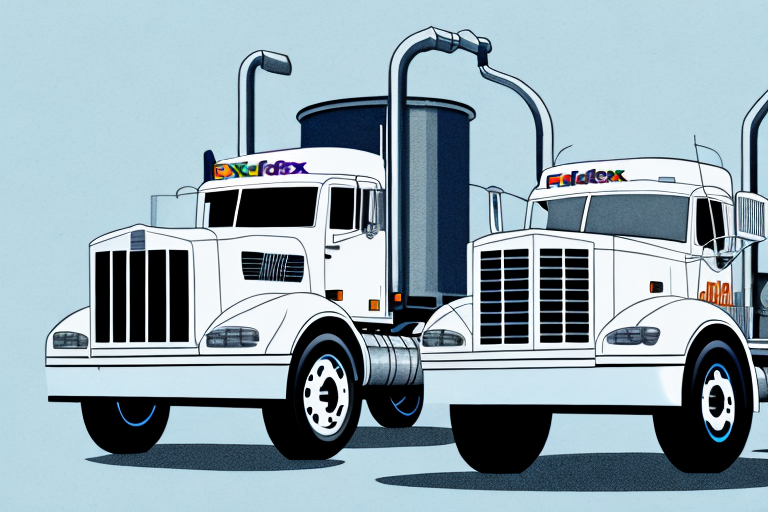What is the FedEx Pre-Paid Fuel Fee?
The FedEx pre-paid fuel fee is a surcharge applied to each shipment to cover the cost of fuel used in transportation. This fee is directly influenced by the current market price of fuel and can fluctuate daily based on global oil prices. By implementing this fee, FedEx aims to mitigate the financial impact of fuel price volatility, ensuring more stable operating costs.
It's important to recognize that the pre-paid fuel fee is not exclusive to FedEx. Other major carriers like UPS and DHL also impose similar fees. The exact amount can vary depending on factors such as shipment distance, package weight, and the carrier's specific pricing structure.
Calculating the FedEx Pre-Paid Fuel Fee
Determining the pre-paid fuel fee is relatively straightforward. The fee is calculated based on the weight of your shipment and its destination. To estimate the pre-paid fuel fee for a specific shipment, you can use the FedEx Rate Tool available on their website.
Manual Calculation Method
If you prefer to calculate it manually, follow these steps:
- Determine the current fuel percentage rate provided by FedEx.
- Multiply this rate by your total transportation charges (excluding any discounts).
- Add any applicable fees to this amount.
It's crucial to distinguish between the pre-paid fuel fee and the fuel surcharge. The pre-paid fuel fee is a fixed amount added to your transportation charges, offering budget predictability. In contrast, the fuel surcharge is a variable fee that adjusts based on real-time fuel prices, providing flexibility to cover fluctuating costs.
The Impact of the Fuel Fee on Shipping Costs
The pre-paid fuel fee can significantly influence your overall shipping expenses, especially for businesses that ship frequently or in large volumes. While the fee might seem negligible for smaller shipments, it can accumulate quickly with larger or more frequent shipments.
Budgeting and Cost Management
Incorporating the pre-paid fuel fee into your budgeting process is essential. FedEx provides a fuel surcharge table on their website, which helps estimate fees based on current fuel prices. Regularly monitoring this table can aid in more accurate cost forecasting and prevent unexpected expenses.
Strategic Shipping Practices
Adopting strategic shipping practices, such as consolidating shipments or optimizing delivery routes, can help mitigate the impact of fuel fees. Additionally, businesses can explore options like shipping during periods of lower fuel costs to maximize savings.
Advantages of the Pre-Paid Fuel Fee Option
Opting for the pre-paid fuel fee presents several benefits that can enhance your shipping strategy:
- Cost Predictability: Paying the fuel fee upfront at a fixed rate helps in budgeting and avoids unexpected fluctuations in shipping costs.
- Operational Efficiency: Consolidating fuel fees into a single line item can streamline the invoicing process, reducing administrative overhead.
- Cash Flow Management: Pre-paying the fuel fee can help manage cash flow by preventing sudden increases in shipping expenses due to rising fuel prices.
- Environmental Impact: By committing to a fixed fuel fee, carriers like FedEx may be encouraged to invest in more fuel-efficient and sustainable transportation methods, contributing to a reduced carbon footprint.
Disadvantages of the Pre-Paid Fuel Fee Option
Despite its benefits, the pre-paid fuel fee option may not be suitable for all shippers:
- Potential Overpayment: If fuel prices decrease after you've pre-paid the fee, you might end up paying more than necessary.
- Flexibility Limitations: Businesses with fluctuating shipping volumes might find it challenging to predict and allocate the pre-paid fuel fees accurately.
- Estimation Risks: Misestimating the required fuel can lead to additional fees or unnecessary expenses if you overpay for fuel that isn't utilized.
Strategies for Managing Shipping Costs with Pre-Paid Fuel Fees
Effective management of shipping costs involves a combination of strategic planning and informed decision-making. Here are some actionable tips:
Analyze Shipment Patterns
Assess your shipment volume, destinations, and frequency. Regular shippers or those shipping to regions with volatile fuel prices may benefit more from the pre-paid fuel fee option.
Optimize Packaging
Using appropriately sized and weighted packaging can help avoid dimensional weight charges, which can inflate shipping costs. Additionally, eco-friendly packaging materials not only reduce environmental impact but can also lead to cost savings.
Stay Informed on Fuel Prices
Keeping abreast of current fuel prices through reputable sources like the U.S. Energy Information Administration (EIA) can help you make informed decisions about when to ship and which fuel fee option to choose.
Explore Alternative Shipping Options
Consider negotiating rates with FedEx or exploring alternative carriers that may offer more competitive fuel fee structures. Tools like shipping rate comparison platforms can aid in identifying the best options for your needs.
Comparing FedEx’s Fuel Fees with Other Carriers
When selecting a shipping provider, it's essential to compare how different carriers structure their fuel fees. While FedEx uses a pre-paid fuel fee system, other carriers like UPS and DHL may have varying approaches:
- UPS: UPS typically uses a variable fuel surcharge that adjusts based on real-time fuel prices, offering flexibility but less predictability.
- DHL: DHL employs a fuel surcharge model similar to FedEx but may differ in rates and calculation methods based on regional fuel markets.
Understanding these differences allows businesses to choose the carrier that aligns best with their budgeting preferences and shipping patterns.
Ensuring You’re Not Overpaying for Fuel Fees
To prevent overpayment on fuel fees, consider the following practices:
Monitor Fuel Price Trends
Utilize resources like the EIA's petroleum section to track fuel price trends and anticipate future changes that may impact your shipping costs.
Leverage Shipping Software
Implementing shipping management software can help in tracking and analyzing shipping expenses, identifying discrepancies, and uncovering potential cost-saving opportunities.
Negotiate with Carriers
Engage in negotiations with FedEx or other carriers to explore customized fuel fee agreements that better suit your shipping volume and frequency, potentially lowering overall costs.
Consider Alternative Shipping Methods
Exploring different shipping methods, such as ground transportation instead of air, can lead to significant fuel cost savings depending on the nature and urgency of your shipments.
Understanding Various Fuel Fees and Their Impact
Pre-paid fuel fees are just one aspect of the broader landscape of fuel-related charges in shipping. It's essential to comprehend the different types of fuel fees to manage your shipping costs effectively:
- Fuel Surcharge: A variable fee that adjusts with real-time fuel prices, providing flexibility to cover fluctuating fuel costs.
- Accessorial Fees: Additional charges for extra services such as residential delivery, liftgate service, or extended delivery hours.
- Fixed Fuel Fees: Similar to pre-paid fuel fees, these are fixed amounts added to shipments to cover fuel costs, offering predictability in budgeting.
By thoroughly understanding and managing these fees, businesses can optimize their shipping strategies, reduce costs, and enhance overall operational efficiency.
In conclusion, the FedEx pre-paid fuel fee plays a crucial role in managing shipping costs amidst fluctuating fuel prices. By comprehensively analyzing your shipping needs, staying informed about fuel market trends, and leveraging strategic management practices, you can effectively navigate fuel fees and maintain cost-effective shipping operations. Additionally, comparing fuel fee structures across different carriers ensures you select the most advantageous shipping partner for your business needs.
For more insights on optimizing your shipping strategies and managing associated costs, visit ShipScience.








